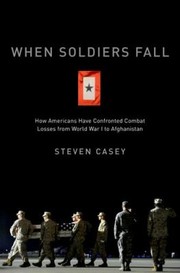Check nearby libraries
Buy this book

"Call it the Vietnam Syndrome or Black Hawk Down blowback. It's the standard assumption that Americans won't tolerate combat casualties, that a rising body count lowers support for war. But that's not true, argues historian Steven Casey; even worse, this assumption damages democracy. Fearing a backlash, the military has routinely distorted its casualty reports in order to hide the true cost of war. When Soldiers Fall takes a new look at the way Americans have dealt with the toll of armed conflict. Drawing on a vast array of sources, from George Patton's command papers to previously untapped New York Times archives, Casey ranges from World War I (when the U.S. government first began to report casualties) to the War on Terror, examining official policy, the press, and the public reaction. Not surprisingly, leaders from Douglas MacArthur to Donald Rumsfeld have played down casualties. But the reverse has sometimes been true. At a crucial moment in World War II, the military actually exaggerated casualties to counter the public's complacency about ultimate victory. More often, though, official announcements have been unclear, out of date, or deliberately misleading--resulting in media challenges. In World War I, reporters had to rely on figures published by the enemy; in World War II, the armed forces went for an entire year without releasing casualty tallies. Casey discusses the impact of changing presidential administrations, the role of technology, the dispersal of correspondents to cover multiple conflicts, and the enormous improvements in our ability to identify bodies. Recreating the controversies that have surrounded key battles, from the Meuse-Argonne to the Tet Offensive to Fallujah, the author challenges the formula that higher losses lower support for war." -- Publisher's description.
Check nearby libraries
Buy this book

| Edition | Availability |
|---|---|
|
1
When Soldiers Fall How Americans Have Confronted Combat Losses From World War I To Afghanistan
2013, Oxford University Press Inc, Oxford University Press
0199890382 9780199890385
|
aaaa
|
Book Details
Classifications
Edition Identifiers
Work Identifiers
Community Reviews (0)
| October 5, 2024 | Edited by MARC Bot | import existing book |
| December 19, 2022 | Edited by MARC Bot | import existing book |
| October 18, 2020 | Edited by MARC Bot | import existing book |
| August 3, 2020 | Edited by ImportBot | import existing book |
| October 18, 2016 | Created by Mek | Added new book. |









